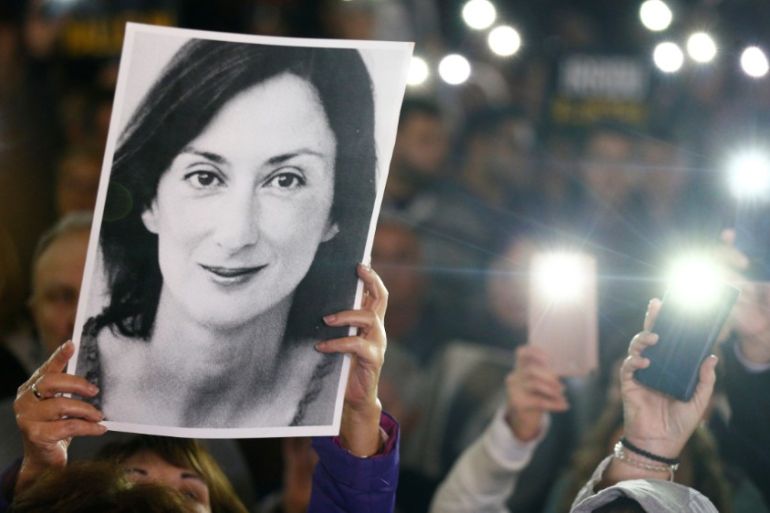Malta: ‘Person of interest’ in journalist murder case released
Daphne Caruana Galizia was killed in a car bombing after exposing corruption through the Panama Papers.

A “person of interest” in the investigation into the murder of a Maltese journalist has been released by the police because they need more time to question him, Malta‘s Prime Minister Joseph Muscat said.
“If a person is taken to court, he or she cannot be further questioned by the police, and in this case, the police want to question him further,” Muscat told journalists on Friday.
Keep reading
list of 3 itemsMalta PM offers pardon for name of journalist killer
Family of slain Malta reporter raise concerns over public inquiry
Prominent businessman Yorgen Fenech was arrested when his yacht was intercepted shortly after it sailed out of a Maltese harbour before dawn on Wednesday. Under Maltese law, those arrested have to be charged or released within 48 hours.
Fenech was released under police surveillance late on Thursday. Neither he nor his lawyer has made any comment since his detention.
|
|
His arrest came a day after Muscat offered to pardon a suspected middleman in the murder of Daphne Caruana Galizia if he provided legally binding evidence of who was behind the killing.
Caruana Galizia, one of Malta’s best-known investigative journalists, was killed in a car bombing as she left her home on October 16, 2017.
Three men are awaiting trial for having set off the deadly bomb. Authorities still need to identify who commissioned the murder, which shocked Europe and raised questions about the rule of law on the Mediterranean island.
On Thursday, Muscat said Fenech’s arrest had not stemmed from information so far provided by the alleged middleman, who has been named as Melvin Theuma.
Investigation
On Friday, Muscat confirmed media reports that Theuma had asked to be admitted to hospital, but said his condition was not believed to be serious. The prime minister said statements so far made by Theuma were still being studied by the police and needed to be corroborated.
Muscat also rebutted criticism from some opposition politicians over the decision to release Fenech.
“This is not a case of the investigators going from hero to zero. The police know what they are doing, they have to comply with the law while being mindful not to undermine their investigation,” he said.
“Their interest and mine is to know all the facts.”
Fenech headed a company that is one of the major shareholders in a power station built after having been granted a government contract.
A Reuters News Agency’s investigation has also shown that he is the owner of a company called 17 Black which was named in emails as being the vehicle for depositing money into the accounts of secret Panama companies owned by Tourism Minister Konrad Mizzi and the government’s chief of staff Keith Schembri.
Mizzi had been energy minister when the power station contract was awarded. It is not known whether any funds actually changed hands. Mizzi and Schembri have always denied wrongdoing and Muscat has repeatedly resisted calls for their dismissal.
Caruana Galizia had revealed the existence of 17 Black and the Panama companies owned by Mizzi and Schembri, although when she died it was still not known that Fenech was behind 17 Black.